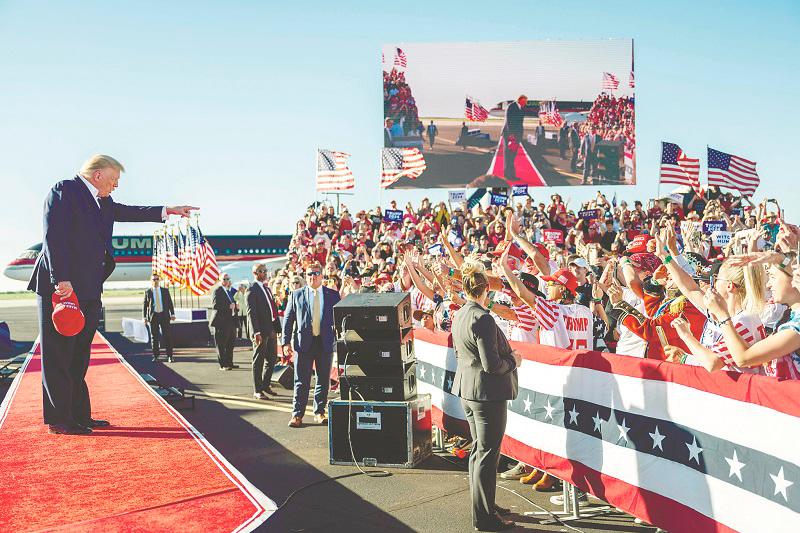THE recent US election results have sparked intense global reflection, with Donald Trump’s unexpected victory prompting widespread debates about politics, morality and the economic anxieties underlying American society.
The world is watching this return with a mixture of surprise, curiosity and concern as Trump reclaims his role in an election where his distinct style and approach to governance triumphed over the Democrats’ emphasis on progressive ideals.
This outcome signals more than a political win as it indicates a powerful shift in voter priorities and highlights the increasingly complex relationship between political power, public trust and morality.
Trump’s campaign, marked by a blend of populist rhetoric and audacious self-assurance, captured a nation growing tired of conventional politics. His victory is particularly noteworthy given the legal challenges he faces, which include numerous charges involving financial misdeeds and alleged improprieties.
Yet, he now stands at the helm of the country, suggesting that the American electorate may be prioritising immediate, tangible concerns over issues of character and legality.
This dichotomy raises questions about the place of morality in modern politics, especially when economic struggles drive voters to seek decisive leaders over upstanding ones.
The proverbial elephant in the room is the US economy, a subject that became the cornerstone of Trump’s appeal and an area where the Democrats may have faltered. The American middle class, long viewed as the bedrock of the nation’s prosperity, has seen stagnating wages and rising living costs.
Concerns over inflation, healthcare costs, housing and education have intensified, with many families struggling to meet their basic needs. These economic hardships are not new but they have reached a boiling point where the electorate is seeking immediate solutions rather than abstract promises of progress.
Trump’s campaign, with its straightforward focus on job creation, tax cuts and economic growth, struck a chord with voters who feel left behind by the current system.
The Democrats appeared more focused on social issues and progressive policies, which, though significant, failed to resonate with
voters increasingly anxious about their economic well-being.
While their manifesto championed inclusivity, climate policy and social equity, it offered less in terms of concrete economic measures to address the financial struggles facing everyday Americans.
This disconnect arguably cost them the election as voters obviously prioritised economic stability over idealistic visions of social change.
The Democrats’ inability to address these bread-and-butter concerns may reflect a broader struggle within the party to balance progressive values with the immediate needs of a
diverse electorate.
For many voters, issues of inclusivity, though important, were secondary to the desire for a more robust economy.
Internationally, Trump’s re-election hyped as Trump 2.0 brings a renewed sense of unpredictability. Allies are likely reassessing their diplomatic strategies, particularly given Trump’s previous stance on issues such as Nato (North Atlantic Treaty Organisation) funding, trade tariffs and foreign policy interventions.
Many European nations, for instance, have expressed unease at his unilateral approach to international relations, fearing that a lack of cooperation could strain alliances that have historically provided stability.
For countries such as China and Russia, however, Trump’s win may signal a more predictable relationship as they understand and expect his pragmatic, sometimes isolationist stance. This could shift the balance of power globally, influencing trade agreements, security alliances and international treaties in ways that may reshape the geopolitical landscape.
Domestically, Trump’s support has been bolstered by an electorate increasingly disillusioned with traditional politics and desperate for a change that directly impacts their lives. The middle-class experience has been one of economic contraction, with fewer opportunities for advancement and a declining quality of life.
Issues like stagnant wages, expensive healthcare and the high cost of education are immediate and pressing, and voters want politicians who promise real solutions rather than abstract ideals.
Trump, with his promises of lower taxes,
job growth and infrastructure improvements, presents a straightforward, though controversial, alternative.
For many Americans, his policies seem to speak to their needs more directly than the Democratic platform, which is seen by some as detached from everyday struggles.
In this political climate, morality and legality appear secondary to pragmatism and economic urgency. The electorate’s willingness to overlook Trump’s legal controversies suggests a shift in values, where the demand for immediate action on economic issues overshadows concerns about personal integrity.
While some critics argue that this acceptance undermines the democratic process by lowering standards of accountability, others contend that it reflects a deeper frustration with the political system’s failure to address core issues.
The growing emphasis on economic relief over character is indicative of an electorate willing to compromise on ethics for the promise of better living conditions.
Trump’s victory reveals a transformation within American society and perhaps a wider, global trend: the prioritisation of tangible outcomes over moral expectations.
This election has shown that voters, when faced with economic hardship, may be more inclined to support a flawed leader who addresses their concerns than a morally upright one whose policies feel detached from their struggles.
As we move forward, this dynamic raises critical questions about the future of democracy and the standards we hold for our leaders.










